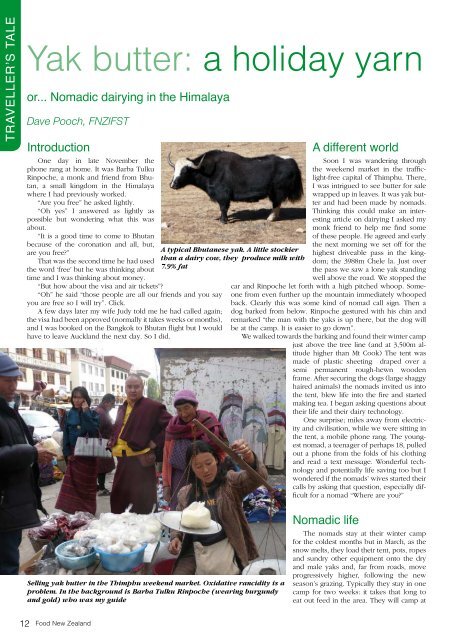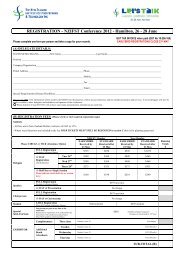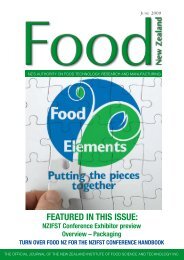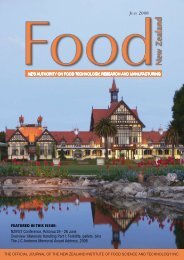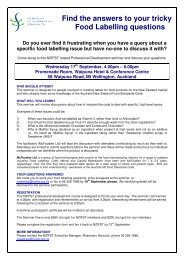featured in this issue - NZIFST - The New Zealand Institute of Food ...
featured in this issue - NZIFST - The New Zealand Institute of Food ...
featured in this issue - NZIFST - The New Zealand Institute of Food ...
Create successful ePaper yourself
Turn your PDF publications into a flip-book with our unique Google optimized e-Paper software.
TRAVELLER’S TALE<br />
Yak butter: a holiday yarn<br />
or... Nomadic dairy<strong>in</strong>g <strong>in</strong> the Himalaya<br />
Dave Pooch, F<strong>NZIFST</strong><br />
Introduction<br />
One day <strong>in</strong> late November the<br />
phone rang at home. It was Barba Tulku<br />
R<strong>in</strong>poche, a monk and friend from Bhutan,<br />
a small k<strong>in</strong>gdom <strong>in</strong> the Himalaya<br />
where I had previously worked.<br />
“Are you free” he asked lightly.<br />
“Oh yes” I answered as lightly as<br />
possible but wonder<strong>in</strong>g what <strong>this</strong> was<br />
about.<br />
“It is a good time to come to Bhutan<br />
because <strong>of</strong> the coronation and all, but,<br />
are you free”<br />
That was the second time he had used<br />
the word ‘free’ but he was th<strong>in</strong>k<strong>in</strong>g about<br />
time and I was th<strong>in</strong>k<strong>in</strong>g about money.<br />
“But how about the visa and air tickets”<br />
“Oh” he said “those people are all our friends and you say<br />
you are free so I will try”. Click.<br />
A few days later my wife Judy told me he had called aga<strong>in</strong>;<br />
the visa had been approved (normally it takes weeks or months),<br />
and I was booked on the Bangkok to Bhutan flight but I would<br />
have to leave Auckland the next day. So I did.<br />
A different world<br />
Soon I was wander<strong>in</strong>g through<br />
the weekend market <strong>in</strong> the trafficlight-free<br />
capital <strong>of</strong> Thimphu. <strong>The</strong>re,<br />
I was <strong>in</strong>trigued to see butter for sale<br />
wrapped up <strong>in</strong> leaves. It was yak butter<br />
and had been made by nomads.<br />
Th<strong>in</strong>k<strong>in</strong>g <strong>this</strong> could make an <strong>in</strong>terest<strong>in</strong>g<br />
article on dairy<strong>in</strong>g I asked my<br />
monk friend to help me f<strong>in</strong>d some<br />
<strong>of</strong> these people. He agreed and early<br />
the next morn<strong>in</strong>g we set <strong>of</strong>f for the<br />
highest driveable pass <strong>in</strong> the k<strong>in</strong>gdom;<br />
the 3988m Chele la. Just over<br />
the pass we saw a lone yak stand<strong>in</strong>g<br />
well above the road. We stopped the<br />
car and R<strong>in</strong>poche let forth with a high pitched whoop. Someone<br />
from even further up the mounta<strong>in</strong> immediately whooped<br />
back. Clearly <strong>this</strong> was some k<strong>in</strong>d <strong>of</strong> nomad call sign. <strong>The</strong>n a<br />
dog barked from below. R<strong>in</strong>poche gestured with his ch<strong>in</strong> and<br />
remarked “the man with the yaks is up there, but the dog will<br />
be at the camp. It is easier to go down”.<br />
We walked towards the bark<strong>in</strong>g and found their w<strong>in</strong>ter camp<br />
just above the tree l<strong>in</strong>e (and at 3,500m altitude<br />
higher than Mt Cook) <strong>The</strong> tent was<br />
made <strong>of</strong> plastic sheet<strong>in</strong>g draped over a<br />
semi permanent rough-hewn wooden<br />
frame. After secur<strong>in</strong>g the dogs (large shaggy<br />
haired animals) the nomads <strong>in</strong>vited us <strong>in</strong>to<br />
the tent, blew life <strong>in</strong>to the fire and started<br />
mak<strong>in</strong>g tea. I began ask<strong>in</strong>g questions about<br />
their life and their dairy technology.<br />
One surprise; miles away from electricity<br />
and civilisation, while we were sitt<strong>in</strong>g <strong>in</strong><br />
the tent, a mobile phone rang. <strong>The</strong> youngest<br />
nomad, a teenager <strong>of</strong> perhaps 18, pulled<br />
out a phone from the folds <strong>of</strong> his cloth<strong>in</strong>g<br />
and read a text message. Wonderful technology<br />
and potentially life sav<strong>in</strong>g too but I<br />
wondered if the nomads’ wives started their<br />
calls by ask<strong>in</strong>g that question, especially difficult<br />
for a nomad “Where are you”<br />
A typical Bhutanese yak. A little stockier<br />
than a dairy cow, they produce milk with<br />
7.9% fat<br />
Sell<strong>in</strong>g yak butter <strong>in</strong> the Thimphu weekend market. Oxidative rancidity is a<br />
problem. In the background is Barba Tulku R<strong>in</strong>poche (wear<strong>in</strong>g burgundy<br />
and gold) who was my guide<br />
Nomadic life<br />
<strong>The</strong> nomads stay at their w<strong>in</strong>ter camp<br />
for the coldest months but <strong>in</strong> March, as the<br />
snow melts, they load their tent, pots, ropes<br />
and sundry other equipment onto the dry<br />
and male yaks and, far from roads, move<br />
progressively higher, follow<strong>in</strong>g the new<br />
season’s graz<strong>in</strong>g. Typically they stay <strong>in</strong> one<br />
camp for two weeks: it takes that long to<br />
eat out feed <strong>in</strong> the area. <strong>The</strong>y will camp at<br />
12<br />
<strong>Food</strong> <strong>New</strong> <strong>Zealand</strong>


